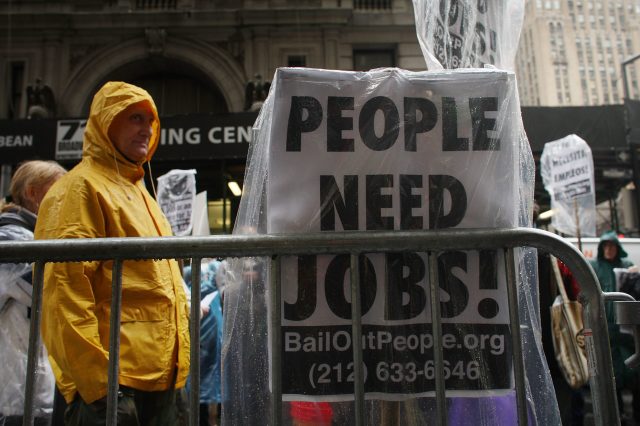NEW YORK – APRIL 03: People demonstrate in the financial district on April 3, 2009 in New York, New York. Dozens of anti-capitalist protesters gathered in the financial district to begin a two day rally against Wall St. and the recent government bailout of banks and financial institutions. (Photo by Spencer Platt/Getty Images)

Regular readers of this column will know that one of my obsessions is post-scarcity economics. When a once-scarce resource becomes super-abundant all sorts of weird stuff starts happening. For a start, super-abundant things don’t need to be rationed by the price mechanism. Indeed, their price drops down towards zero, meaning that they fall out of the economy as conventionally measured. Counter-intuitively, this means that super-abundance is bad for growth, productivity and wages – as long as we measure these things in terms of monetary value (and how else would you want your wages measured?).
Examples of things that are super-abundant – or on the way to being so – include information, entertainment, data storage, food calories and renewable energy (at times of peak production). This is not true for everyone and in every place, of course; but as William Gibson once said “the future is already here, it’s just not very evenly distributed”.
The growing scale and sophistication of automation will speed our progress towards universal super-abundance. But that leaves the question of the raw materials from which we make stuff. Robots will one day make just about any consumer good we could hope for, just not out of thin air.
Given the demands placed upon it by the hyper-productive industries of the future, will our battered planet be able to cope?
Maybe not, but according to Aaron Bastani in the London Review of Books, we won’t be limited to one world. Before too long, he says, the rest of the Solar System will be within our grasp – especially its mineral-bearing asteroids:
“A platinum-rich asteroid 500 metres in diameter could contain nearly 175 times the annual global platinum output, and 1.5 times the known world reserves of platinum group metals. One of the largest known asteroids in the solar system, 16 Psyche, is a floating chunk of iron, nickel, copper and other rare metals, including gold and platinum. Its value? Around ten thousand quadrillion dollars; annual global GDP is $74 trillion.”
Now that’s what I call post-scarcity. There is a catch, though:
“…how would investors… get a return? One solution would be to follow the example set by the diamond industry after the discovery of South Africa’s abundant reserves: artificially restrict the supply, and sell mined space commodities at a price marginally below the cost of production of any mine on Earth…”
Bastani is a man of the radical left, and believes the state would have to stop the capitalists from denying us the post-scarcity economy we deserve:
“…there is an alternative model of collective ownership that would see the price of precious metals and minerals, all with multiple applications, drop close to zero. Combined with the emergence of general artificial intelligence and ever-cheaper renewable energy, it would be the basis of what’s become known as ‘fully automated luxury communism’…
“As outlandish as it sounds, space exploration, like AI and renewables, is an important terrain on which a rising left must fight.”
I’m not as confident about our ability to mine asteroids before this century’s done, but Bastani raises a genuinely interesting question: would capitalism stand in the way of a post-scarcity economy?
The first thing to say is that capitalism has done a pretty good job of getting us this far towards post-scarcity – which, compared to the pre-capitalist age, is very long way indeed. Furthermore, capitalists have found continually creative ways of using increasingly plentiful commodities like computing power, food calories and clean energy to develop new and sought-after products and services. Abundance provides a foundation for new and profitable business models that sustain the cycle of investment, innovation and profit.
Many of the world’s biggest companies today – such as Amazon, Google, Facebook – didn’t even exist 30 years ago; and typically their business models are about making once scarce resources cheaply or freely available to consumers.
Capitalism can, therefore, maintain our progress towards abundance (if only of the material variety). We don’t need the state to seize the means of production.
What we might need the state to do, however, is seize the means of consumption. If robots are doing everything for us then who will earn the wages required to buy the products of unpaid robot labour? It’s another good question, to which I offer an answer here.










Join the discussion
Join like minded readers that support our journalism by becoming a paid subscriber
To join the discussion in the comments, become a paid subscriber.
Join like minded readers that support our journalism, read unlimited articles and enjoy other subscriber-only benefits.
Subscribe